Jef Mallett – Trizophrenia
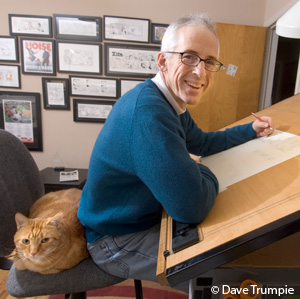
The Frazz comic strip has given many of us a laugh as the stories seem to take pages out of our lives. Jef Mallett from Lansing, Michigan is the man behind Frazz and he recently published Trizophrenia – Inside the Minds Of a Triathlete.
Slowtwitch: Jef, we are glad you have time to chat with us.
Jef: Thanks! I love Slowtwitch – and I’m told I love to chat.
ST: Your new book “Trizophrenia: Inside the Minds of a Triathlete” is out now. What has been the response so far?
Jef: Right now is the good part, where I’m hearing from people who like it. And you can’t not like that. But the real gratifying news is that they like the book for the reasons I hope they do. They very quickly tell me it’s funny, as if that’s just assumed – and why shouldn’t it be, for an author who writes a comic strip? – and move on to the good stuff. They’ll tell me it makes them think, or gives them a new way to look at things, or teaches them something they didn’t know, or reaffirms their love for the sport or gives them a better understanding of a sport they always thought was crazy, and that’s what really makes my day. “Trizophrenia” isn’t a how-to book at all. It’s more of a why-we’re-that-way book, or even a funny-philosophy-book-with-a-lot-of-triathlon-cartoons sort of affair, which probably isn’t what people expect from a triathlon book. But I like that it’s what they’ve come to expect from me.
ST: When did you first realize that you had a gift for comic strips?
Jef: Some weeks, I still wonder if I do. But that’s the way it should be. I loved comics as a kid. That’s how I learned to read. And I drew cartoons as a kid, which all kids do and do well. When I was in high school, I drew a daily comic strip for the local newspaper, The Pioneer, in Big Rapids, Mich. I don’t know about any gifts, but that’s when I knew it was what I wanted to do with whatever talent I could develop. Then I got a day job, waited 20 years, and created “Frazz.”
ST: Since Frazz seems to be modeled after you, do some of your friends call you Frazz?
Jef: I have a friend nicknamed Frazz. Does that count? He was a fighter pilot in the Marines during the Korean War, and Frazz was his call sign. He moved on to handle the licensing and merchandising side of Peanuts and became the best of friends with Charles Schulz. When you think about it, he’s one of the few people who substantially affected our cultural landscape. And I have never, ever heard him make a joke that involved “working for Peanuts.” Now, that’s a Frazz to aspire to.
ST: A friend name Frazz counts too for sure. But the experiences for the strips mostly come from your personal experiences, right?
Jef: Absolutely. Frazz is me. All writing is autobiographical at its core, and I just opted to go straight there. Of course, if you're going to model your main character after your own life, then you owe it to your readers to go out and have the most interesting life possible. Turns out that's a pretty good way to live in general, so it's nice to have that as your motivation — or your rationale. I still haven't gotten up the nerve to try and write off all my triathlon gear as a business expense, though.
ST: What is the percentage of swim / bike / run related topics on Frazz?
Jef: Oh, man, that’s heavy math for a cartoonist. For a guy who’s perhaps a little too obsessed with his Garmin and Power Tap, and learning to figure out the lap timer beside the pool, I do Frazz by feel. I think about the sports constantly, and they’re always in the background, and I try to bring them to the surface just as much as I can without alienating half the people I know. Just like life.
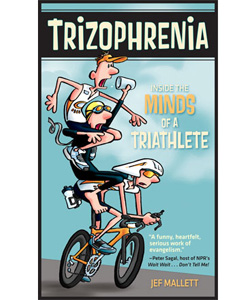
ST: Along those lines, do the editors at various newspapers ever give you a hard time about bike stuff in the strips?
Jef: Editors don’t seem to get too involved with the syndicated stuff. They buy it or drop it and occasionally run a comics survey with a column about how scary it is to mess with the comics (while somehow, universally, failing to consider that if the readers are so passionate about their comics it might be worth adding a page to the section). Readers get back to me, though. And I hear a lot of thanks for recognizing triathlon and its components, for showing it’s cool to be fit, for showing it’s fun to sweat, and for knowing how to draw a damn bike. Some people do complain, usually charging me with elitism and snobbery. Apparently I draw expensive damn bikes.
ST: We looked back at certain cycling / tri dates this year and it doesn’t seem that you are inspired along those lines on those days. Or is there a certain delay because of scheduling?
Jef: That’s a good question. Sometimes I’ll tie a strip to a certain bike event – I’ve made timely jokes about the spring classics like the Paris-Roubaix – and I certainly try to stick to the seasons. This past summer, Frazz just happened to be off racing an Ironman-distance race in the Sunday strip that ran when I was off racing Ironman Louisville. There is a delay between when I draw the strips and when they run, but I always know which date any given cartoon will appear, so that’s no excuse. I think I’m just better at keeping track of general things than specific things.
ST: Unlike in the regular comic strips, did writing Roadie and now Trizophrenia allow you to add inside jokes into these books without having to worry that the readers might not get it?
Jef: You do get to enjoy a different approach to books than you use with comic strips. One’s not better than the other, but variety is always good. With a comic strip, it all has to take place in a few panels and be accessible by a general audience. While Roadie and Trizophrenia look like they’re aimed at a more specific market, they’re both intended to teach people who are unfamiliar with those sports at the same time they’re entertaining veterans. So you don’t want to do something too insiderish. But you do have the luxury of having a few extra pages to explain and flesh out a point, a concept or a picture. Which means you owe your reader an even bigger payoff for the extra work. Now, Roadie was written by Jamie Smith. I just illustrated it, following his lead and/or trying to keep up with him. With Trizophrenia, I wrote and illustrated it. Which somehow didn’t make it any easier to know what the author was getting at sometimes.
ST: How long did it take you to write Trizophrenia?
Jef: That’s like asking Craig Alexander how long it took him to train for Kona. There’s a schedule leading up to the big event, but really, that part is just for pulling together elements you’ve spend a lifetime compiling.
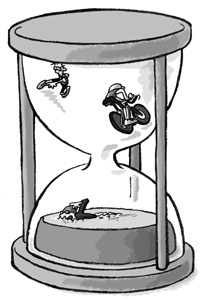
ST: Did you recycle anything here or did you truly start from scratch?
Jef: I definitely recycled a lot of stories and memories. That’s writing. But I recycled very little previously published material from Frazz or my columns in Triathlete and Inside Triathlon. There’s nothing wrong with doing that, but everything is written with its own audience, purpose and I suppose client in mind, and it’s almost more work trying to reuse older writing than it is creating new stuff from scratch.
ST: Are there specific cyclists or triathletes you draw most of your inspirations from?
Jef: There’s a big difference between impressed and inspired. And kind of ironically, it’s hard to be inspired by the superstars. They’re as real as you and me, I know, and I’m sure very interesting. But beyond whatever marketing their sponsors throw at me, or the occasional profile, I don’t really know many of them. So when Bjorn Andersson, for example, scoots his bike through the Savageman triathlon twice as fast as me and everyone else, I’m impressed. Boy, am I impressed. But inspiration is a very personal thing, and I just don’t know him. Yet. Perhaps. Last spring, when my 71-year-old mother and my wife with MS finished the local Hawk Island sprint triathlon? That was inspiring.
ST: The question was not so much if your personal life is inspired by various athletes, but if for example Bjorn Andersson’s effort or similar will find its way in some shape or form in a future Frazz story.
Jef: Well, there’s the week of Frazz I did a couple of years ago after I entered my first Masters swim meet and got thoroughly trounced by everyone there, including, notably, a 75-year-old. I still don’t know the guy’s name, but that’s the kind of athlete who inspires me — and not just in terms of material.
ST: How did you get involved with cycling and when did you switch to triathlon?
Jef: When I was a little kid, my dad bought a bike to stick it to OPEC during the first oil embargo. OPEC didn’t get the message, but I did. I don’t know if I consciously noticed him getting fitter and happier, but I figured out quickly that he could bike the five miles to town almost as quickly as he could drive it. This, I figured, was my ticket out of riding the miserable school bus. Of course, it was also a lot of fun, and one thing led to another.
When I was finishing up high school, the first reports of this weird new “Ironman” race in Hawaii got my attention. This, I figured, was my sport and my destiny. Once I learned how to swim, anyway. When I did do my first triathlon (not in Hawaii. Not then, not yet), I looked at the splits and went straight into bike racing, where nobody made me swim. I bounced back and forth between tri and bike racing for a while, but triathlon started exerting a stronger pull over time. And when I traded my more traditional job environment (meaning one with health insurance and co-workers who could cover me if I got hurt) for the very solo act of a cartoonist, triathlon seemed far more prudent. Now I can’t imagine giving it up for any other sport, or any reason at all.
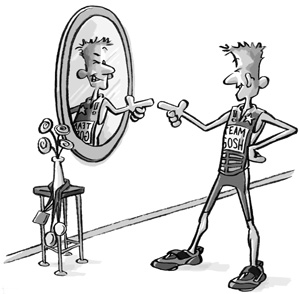
ST: Did that also mean that the t-shirts of Frazz switched to more tri specific themes?
Jef: You know, I suppose they have.
ST: We assume you have a Cervelo P2C in your garage because of recent Frazz strips. Is that so and what other bikes do you have?
ST: I race on a Cervelo P3, from 2004, back when they were still aluminum. I love that bike. Enough that I later replaced my (I’ll admit it) perfectly good road bike with another Cervelo, a carbon Soloist. I also have a Torelli Pista track bike, with a front brake for road use (which I recommend highly, hipster image be damned). An ancient Klein mountain bike. My wife and I share a Burley Rivazza tandem. And of course that road bike I replaced with the Soloist is still around.
ST: Are companies approaching you with swag items to get you to write about / use their products in your strips?
Jef: Approaching me? No. Quid pro quo? No again. But a number of sharp-eyed businessmen have noticed their logos or names in Frazz and written to say thanks. Turns out this business attracts some interesting, bright, genuinely good people, and I’ve made some new friends who happen to work in the business at one level or another. And sometimes we do trade a few of our wares – a signed original goes one way, and a jersey goes the other, for example. It’s very exciting, but it’s exciting because it’s personal. If I did it specifically for the swag, I’m sure the fun would go out of it right away.
ST: Do you have any other books planned?
Jef: Right now my efforts are all focused on giving Trizophrenia its due, getting it in front of as many readers as possible. Also, I have a little catching up to do with Frazz and Triathlete and VeloNews and the rest of my life. I sure hope I’ll do more books. I can’t picture it any other way, and I picture things for a living.
ST: Have you been able to race this summer”
Jef: Yes, but it was pretty evident I was distracted trying to finish up a book. No personal records, I’m sure, and just two podium appearances, one of which was earned mostly by my dog in the MSU vet school’s Canine Cruise 5K. I did a sprint in May, an Olympic and a slightly super-intermediate in June, a half-iron in July, and then Ironman Louisville while everything was really coming to a head (doing a long-course on several weeks of about four hours of sleep per night: Not recommended. But possible). In October, I signed up for the Grand Rapids (Mich.) Marathon about a week and a half before race day because I was going to be in town with time on my hands, so apparently I wasn’t done being foolish. But passable performances (I managed a 12:19 in Louisville and a 3:43 in Grand Rapids) under questionable circumstances are their own kind of triumph. You just file them under “potential” instead of “boasts.”

ST: What other sports do you follow?
Jef: I’m not so good at following sports. I’d rather go out and do something myself. But I do make an exception for pro bike racing. I love following that, especially the spring classics. I’m open to trying all sorts of other sports, but nothing has come close to pulling me away from the simple joy of swimming, biking and running. And training and keeping logs and watching what I eat and signing up for races and trying but failing to get into others and getting up early and schlepping a ton of gear someplace so I can do all three in a row as fast as possible in the middle of a great big crowd. So maybe “simple” joy is overstating it. But nothing else has had a lot of success horning in.
ST: Talk about your music taste.
Jef: Eclectic. My CD collection (no real need for an MP3 when I work at home and prefer to train with ambient noise and the voices in my head) looks like someone sprayed adhesive all over me, turned me loose in a CD store and let me keep whatever stuck. Since I’m a storyteller, I tend to gravitate toward singer-songwriters. I listen to a lot of Lyle Lovett, Todd Snider, John Hiatt, Dar Williams and Fountains of Wayne. Lately I’ve been wearing out “Country Club.” John Doe, former punker of “X” fame, goes country, and it’s sublime.
ST: What was the last book you read?
Jef: “The Guinea Pig Diaries,” by A.J. Jacobs. It’s funny and informative and smart as hell. And he ruins what I said in one of my earlier answers, because I’ve never met Jacobs and he’s absolutely an inspiration.
ST: Is there anything else we should know about you?
Jef: There’s a lot more I should know about myself, and I’m learning it every day. Writing and racing will do that for you.


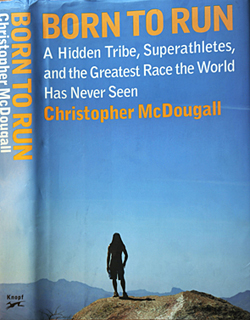
Start the discussion at slowtwitch.northend.network